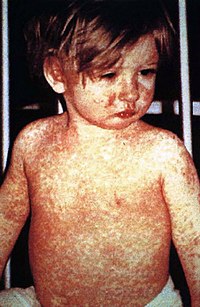
Photo from wikipedia
Purpose IL-33 is constitutively expressed in skin tissues. Alopecia, a T cells-driven disorder of the hair follicles (HFs), is a common complication in the development of psoriasis. However, the role… Click to show full abstract
Purpose IL-33 is constitutively expressed in skin tissues. Alopecia, a T cells-driven disorder of the hair follicles (HFs), is a common complication in the development of psoriasis. However, the role of IL-33 in psoriatic alopecia remains uncovered. Here, we investigated the roles of IL-33 in inducing pathological changes of hair follicles in psoriasis. Patients and Methods Clinical samples and imiquimod (IMQ)-induced psoriatic mice samples were used to investigate the pathological changes and T-cell infiltration of HFs. By using immunohistochemistry staining, the distribution and expression alteration of IL-33 in HFs were determined. Next, by using IL-33 and ST2 knockout mice, we investigated the role of IL-33/ST2 axis in the pathological changes of HFs in psoriasis. Meanwhile, recombinant IL-33 protein was subcutaneous injected to confirm its effect. Finally, RNA sequencing was used to clarify the genes and signaling pathways that involved in this process. Differentially expressed genes were further verified by RT-PCR in cultured HFs in vitro. Results We found that the pathological changes of HFs and T cells infiltration in imiquimod-induced psoriatic mice were similar to that in psoriasis patients. The IL-33 positive keratinocytes in the outer root sheath of HFs were increased in both psoriasis patients and psoriatic model mice compared with the controls. By using gene knockout mice, we found that the pathological changes and T cell infiltration were attenuated in IL-33−/− and ST2−/− psoriatic model mice. In addition, subcutaneous injection of recombinant IL-33 exacerbated the pathological changes of HFs and T cell infiltration. RNA sequencing and RT-RCR revealed that IL-33 upregulated the transcription of genes related to keratinocytes proliferation and T lymphocytes chemotaxis. Conclusion Our study identifies that IL-33 promotes the pathological changes of HFs in psoriasis, which contributes to psoriatic alopecia. Inhibition of IL-33 may be a potential therapeutic approach for psoriatic alopecia.
Journal Title: Clinical, Cosmetic and Investigational Dermatology
Year Published: 2023
Link to full text (if available)
Share on Social Media: Sign Up to like & get
recommendations!